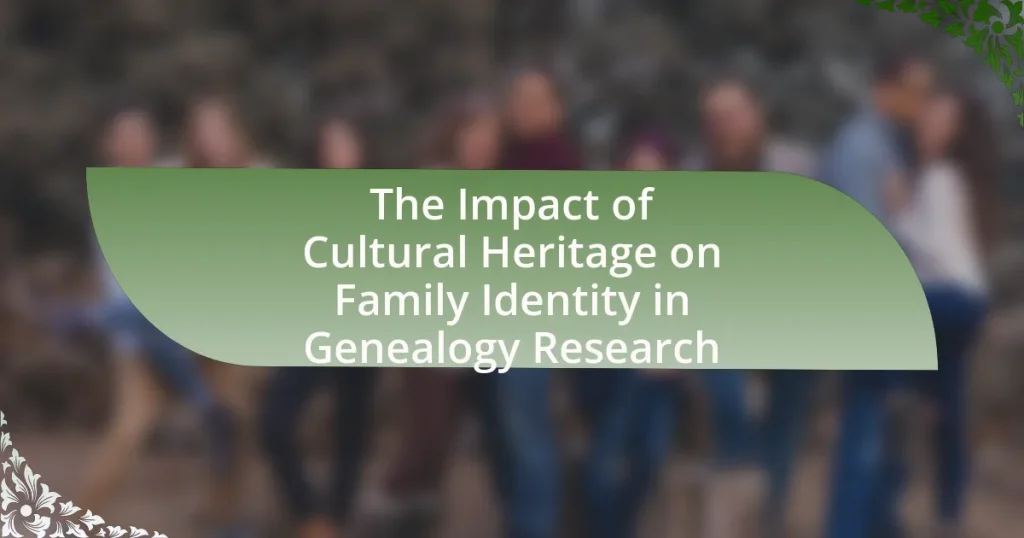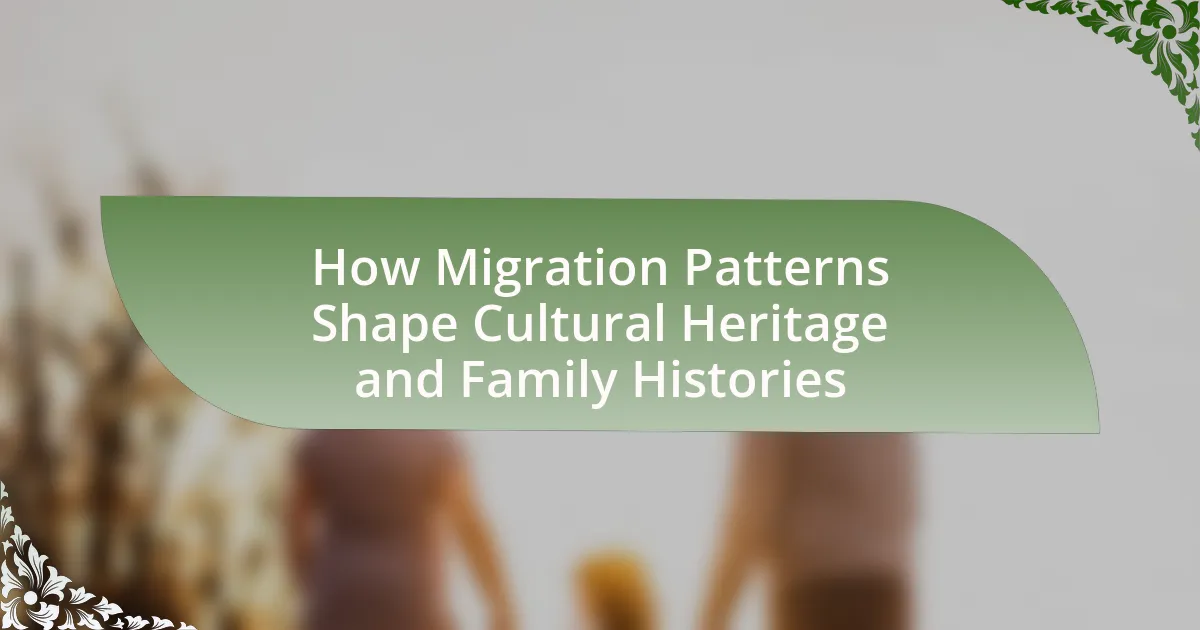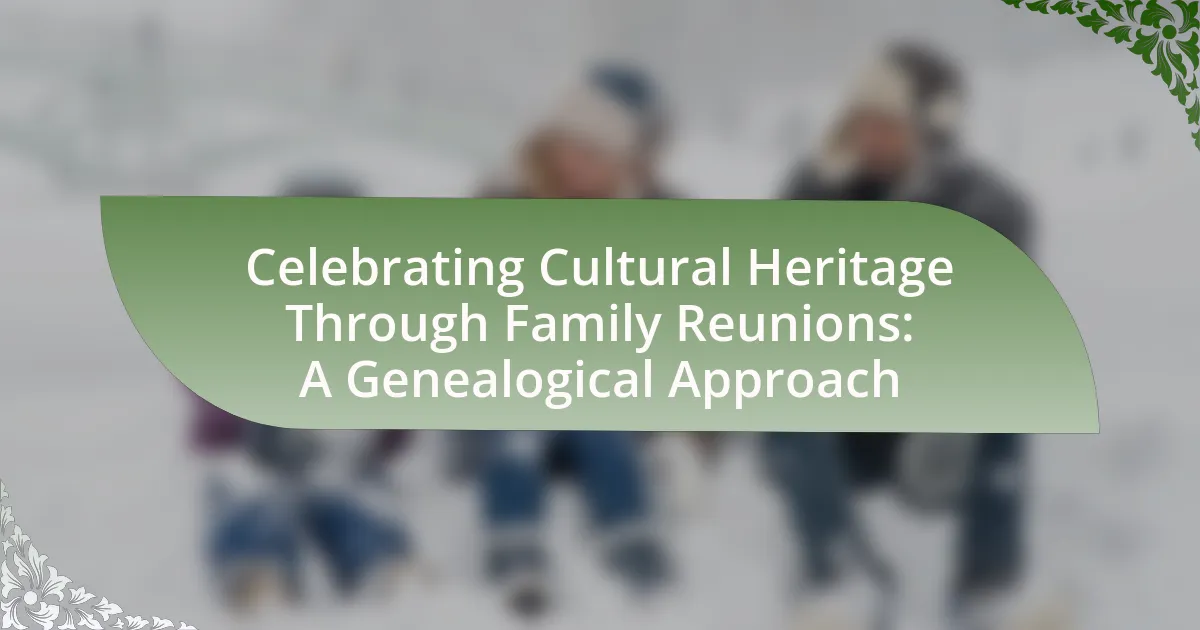Cultural heritage plays a crucial role in shaping family identity within genealogy research by providing a framework for understanding familial connections and historical narratives. This article explores how elements such as traditions, language, religion, and historical narratives influence family identities and the methodologies used in genealogical research. It highlights the importance of cultural heritage in preserving family history, enhancing the accuracy of genealogical findings, and fostering a sense of belonging among family members. Additionally, the article addresses challenges in integrating cultural heritage into genealogy, ethical considerations, and best practices for researchers to ensure respectful representation of diverse cultural identities.
What is the Impact of Cultural Heritage on Family Identity in Genealogy Research?
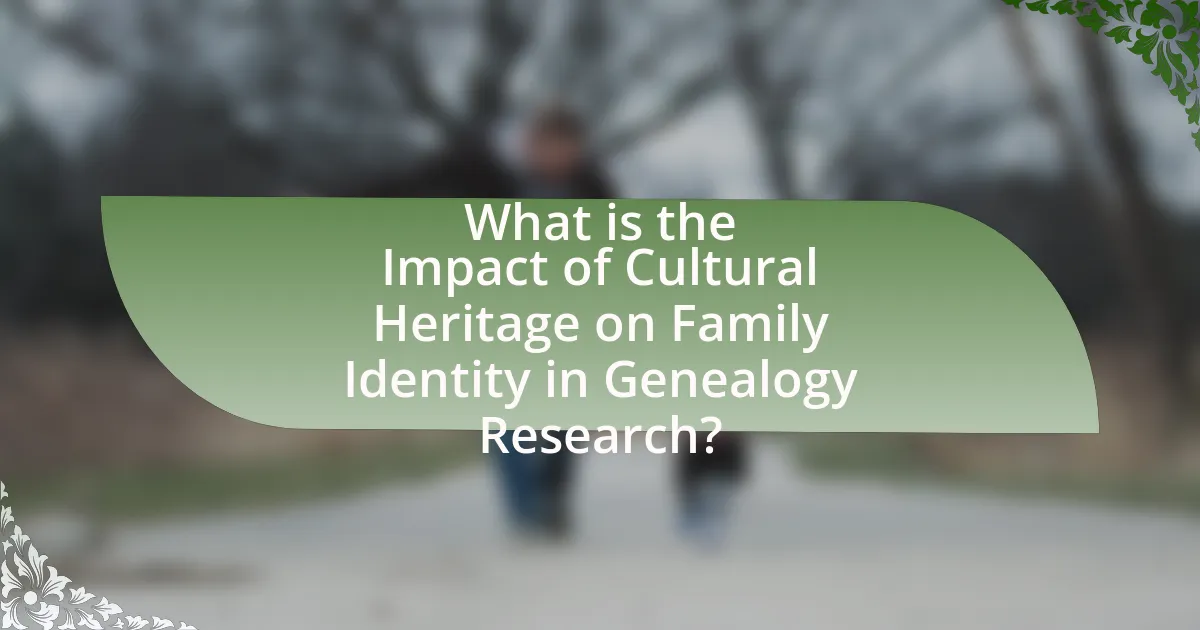
Cultural heritage significantly shapes family identity in genealogy research by providing a framework for understanding familial connections and historical narratives. This influence manifests through the preservation of traditions, languages, and customs that define a family’s unique background. For instance, studies show that individuals who explore their ancestry often report a stronger sense of belonging and identity linked to their cultural roots. Research conducted by the Pew Research Center indicates that 64% of Americans believe knowing their family history is important to their identity, highlighting the role of cultural heritage in fostering personal and familial connections.
How does cultural heritage shape family identity in genealogy?
Cultural heritage significantly shapes family identity in genealogy by providing a framework of shared values, traditions, and historical narratives that define familial connections. This framework influences how families perceive their lineage, often emphasizing cultural practices, language, and historical events that have been passed down through generations. For instance, research indicates that families with strong ties to their cultural heritage often engage in specific rituals or celebrations that reinforce their identity, such as traditional festivals or religious observances. These practices not only strengthen familial bonds but also create a sense of belonging and continuity within the family unit, as evidenced by studies showing that individuals who actively participate in cultural traditions report a stronger sense of identity and connection to their ancestry.
What elements of cultural heritage are most influential in genealogy?
The most influential elements of cultural heritage in genealogy include traditions, language, religion, and historical narratives. These elements shape family identities and influence how genealogical research is conducted. For instance, traditions often dictate the importance of lineage and ancestry, while language can provide insights into ethnic backgrounds and migration patterns. Religion frequently plays a role in family structures and naming conventions, and historical narratives help contextualize family histories within broader cultural movements. Collectively, these elements contribute to a deeper understanding of familial connections and identities across generations.
How do cultural traditions affect family narratives in genealogy?
Cultural traditions significantly shape family narratives in genealogy by influencing the stories, values, and identities passed down through generations. These traditions often dictate the way families commemorate their history, including rituals, celebrations, and storytelling practices that highlight specific ancestors or events. For instance, in many cultures, oral histories are a primary means of preserving family legacies, where elders recount tales that reflect cultural values and historical experiences, thereby reinforcing a sense of belonging and identity. Additionally, cultural practices such as naming conventions, marriage customs, and migration patterns provide context to family narratives, illustrating how cultural heritage informs individual and collective identities within genealogical research.
Why is understanding cultural heritage important in genealogy research?
Understanding cultural heritage is crucial in genealogy research because it provides context to family histories and influences identity formation. Cultural heritage encompasses traditions, languages, and customs that shape familial connections and narratives. For instance, recognizing the cultural background of ancestors can reveal migration patterns, social structures, and historical events that impacted family development. This understanding allows researchers to construct a more accurate and meaningful family tree, as evidenced by studies showing that individuals who explore their cultural roots report a stronger sense of belonging and identity.
What role does cultural heritage play in preserving family history?
Cultural heritage plays a crucial role in preserving family history by providing a framework through which familial narratives, traditions, and identities are transmitted across generations. This transmission occurs through cultural practices, oral histories, and artifacts that embody the values and experiences of ancestors. For instance, studies show that families who actively engage in cultural traditions, such as storytelling or celebrating specific rituals, are more likely to maintain a strong sense of identity and continuity in their family history. This connection to cultural heritage not only enriches individual family narratives but also fosters a collective memory that reinforces familial bonds and identity.
How can cultural heritage enhance the accuracy of genealogical research?
Cultural heritage enhances the accuracy of genealogical research by providing context and depth to family histories. It offers insights into historical migration patterns, social structures, and cultural practices that can clarify familial connections. For instance, understanding the cultural significance of naming conventions can help researchers accurately trace lineage, as certain names may indicate familial ties or regional origins. Additionally, cultural heritage often includes oral histories and traditions that can validate or challenge existing genealogical records, leading to more comprehensive and accurate family trees.
What challenges arise when integrating cultural heritage into genealogy?
Integrating cultural heritage into genealogy presents challenges such as the complexity of accurately representing diverse cultural narratives and the potential for conflicting historical accounts. Genealogical research often relies on documentation that may not capture the full spectrum of cultural practices, leading to incomplete family histories. Additionally, cultural heritage can encompass oral traditions that lack formal records, making it difficult to verify lineage and connections. The interplay between different cultural identities within families can also complicate the understanding of heritage, as individuals may identify with multiple cultures, each with its own historical context. These challenges highlight the need for careful consideration and inclusive methodologies in genealogical research to ensure a comprehensive representation of family identity.
How do differing cultural perspectives impact genealogical findings?
Differing cultural perspectives significantly impact genealogical findings by influencing the interpretation of family histories, the importance placed on lineage, and the types of records that are prioritized. For instance, in cultures that emphasize matrilineal descent, genealogical research may focus more on maternal lines, while patrilineal cultures prioritize paternal ancestry. This can lead to discrepancies in family trees and the understanding of heritage. Additionally, cultural practices regarding naming conventions, record-keeping, and the significance of oral histories can affect the availability and reliability of genealogical data. For example, in some Indigenous cultures, oral traditions are paramount, which may not align with Western archival methods, potentially leading to gaps in documented lineage.
What are common misconceptions about cultural heritage in genealogy?
Common misconceptions about cultural heritage in genealogy include the belief that cultural identity is solely determined by ethnicity or nationality, and that genealogical research can provide a complete and definitive picture of one’s heritage. Many individuals assume that their cultural heritage is fixed and unchanging, ignoring the dynamic nature of cultural identities shaped by migration, intermarriage, and historical events. Additionally, some people mistakenly think that genealogical records are always accurate and comprehensive, while in reality, they can be incomplete or contain errors due to various factors such as record-keeping practices and societal changes.
How can researchers effectively incorporate cultural heritage into their genealogy work?
Researchers can effectively incorporate cultural heritage into their genealogy work by utilizing historical records, oral histories, and cultural artifacts that reflect the traditions and values of specific communities. This approach allows researchers to create a more nuanced understanding of family identities and their connections to broader cultural narratives. For instance, accessing immigration records can reveal the cultural backgrounds of ancestors, while oral histories can provide insights into family traditions and practices that have been passed down through generations. Additionally, engaging with local cultural organizations or communities can enhance the research process by providing context and resources that are culturally relevant, thereby enriching the genealogical narrative with authentic cultural heritage elements.
What resources are available for exploring cultural heritage in genealogy?
Resources available for exploring cultural heritage in genealogy include online databases, local archives, cultural organizations, and historical societies. Online databases such as Ancestry.com and FamilySearch provide access to a vast array of records, including immigration documents, census data, and family trees that reflect cultural backgrounds. Local archives often house unique collections of documents, photographs, and artifacts that can provide insights into specific cultural heritages. Cultural organizations, such as ethnic heritage groups, offer resources, events, and networking opportunities that can enhance genealogical research by connecting individuals with their cultural roots. Historical societies frequently maintain records and publications that document the history of specific communities, further aiding in the exploration of cultural heritage in genealogy.
How does cultural heritage influence the methodology of genealogy research?

Cultural heritage significantly influences the methodology of genealogy research by shaping the sources, techniques, and perspectives utilized in tracing family histories. Researchers often prioritize specific records, such as immigration documents, land deeds, and oral histories, that reflect the cultural practices and traditions of particular ethnic groups. For instance, genealogists studying families of Irish descent may focus on church records and civil registrations that are prevalent in Irish culture, while those researching Jewish ancestry might emphasize synagogue records and Yiddish newspapers. This tailored approach ensures that the research methodology aligns with the unique historical contexts and documentation styles relevant to different cultural backgrounds, enhancing the accuracy and depth of family narratives.
What specific methodologies are used to study cultural heritage in genealogy?
Specific methodologies used to study cultural heritage in genealogy include archival research, oral history interviews, and genetic testing. Archival research involves examining historical documents, such as birth and marriage records, census data, and immigration papers, to trace lineage and understand cultural backgrounds. Oral history interviews capture personal narratives and traditions from family members, providing insights into cultural practices and values that shape family identity. Genetic testing analyzes DNA to reveal ancestral origins and connections, offering a scientific perspective on heritage. These methodologies collectively enhance the understanding of how cultural heritage influences family identity in genealogy research.
How do oral histories contribute to understanding cultural heritage?
Oral histories significantly contribute to understanding cultural heritage by preserving and transmitting the lived experiences, traditions, and values of communities. These narratives provide firsthand accounts that reflect the unique cultural practices and historical contexts of specific groups, allowing for a deeper appreciation of their identity. For instance, oral histories can reveal insights into migration patterns, social structures, and cultural rituals that may not be documented in written records. Research by the Smithsonian Institution highlights that oral traditions are vital for maintaining cultural continuity, especially among Indigenous populations, where storytelling serves as a means of passing down knowledge and fostering community bonds.
What role do historical documents play in revealing cultural heritage?
Historical documents serve as vital resources for uncovering cultural heritage by providing authentic evidence of past societies, traditions, and practices. These documents, such as letters, diaries, official records, and photographs, offer insights into the values, beliefs, and daily lives of individuals and communities. For instance, census records can reveal demographic information and migration patterns, while personal letters can illustrate familial relationships and social norms of a specific era. By analyzing these materials, researchers can reconstruct historical narratives and understand the cultural contexts that shape family identities, thereby highlighting the significance of cultural heritage in genealogy research.
How can technology aid in the exploration of cultural heritage in genealogy?
Technology aids in the exploration of cultural heritage in genealogy by providing access to vast databases, digital archives, and advanced analytical tools. Online platforms like Ancestry.com and FamilySearch.org allow users to search historical records, such as census data and immigration documents, which can reveal ancestral origins and cultural backgrounds. Additionally, DNA testing services, such as 23andMe and MyHeritage, offer insights into genetic heritage, connecting individuals to specific ethnic groups and regions. These technological advancements enhance the understanding of family identity by enabling researchers to trace lineage and uncover cultural narratives that shape personal histories.
What digital tools are available for researching cultural heritage?
Digital tools available for researching cultural heritage include online databases, digital archives, Geographic Information Systems (GIS), and virtual reality platforms. Online databases such as Europeana and the Digital Public Library of America provide access to millions of cultural heritage items, while digital archives like the National Archives and Library of Congress offer primary source materials. GIS tools enable researchers to analyze spatial relationships and historical data, enhancing the understanding of cultural contexts. Additionally, virtual reality platforms allow for immersive experiences of historical sites and artifacts, facilitating deeper engagement with cultural heritage. These tools collectively support comprehensive research in the field of cultural heritage.
How do online databases enhance access to cultural heritage information?
Online databases enhance access to cultural heritage information by providing centralized, searchable repositories of historical records, artifacts, and narratives. These databases allow users to easily locate and retrieve information about their ancestry, cultural practices, and historical events, which is crucial for genealogy research. For instance, platforms like Ancestry.com and FamilySearch offer millions of digitized records, including census data, birth and death certificates, and immigration records, enabling individuals to trace their family lineage and understand their cultural heritage more comprehensively. This accessibility democratizes information that was previously confined to physical archives, thus fostering a deeper connection to personal and collective identities.
What are the ethical considerations when researching cultural heritage in genealogy?
Ethical considerations when researching cultural heritage in genealogy include the respect for privacy, informed consent, and the potential for cultural appropriation. Researchers must ensure that they do not disclose sensitive information about living individuals without their permission, as this can violate privacy rights. Informed consent is crucial, particularly when dealing with indigenous or marginalized communities, as these groups may have specific cultural protocols regarding the sharing of their heritage. Additionally, researchers should be aware of the implications of cultural appropriation, ensuring that they represent cultural narratives authentically and respectfully, rather than exploiting them for personal gain. These considerations are essential to maintain integrity and foster trust within communities involved in genealogical research.
How should researchers approach sensitive cultural topics in genealogy?
Researchers should approach sensitive cultural topics in genealogy with respect and cultural sensitivity. This involves understanding the historical context and significance of cultural practices and beliefs, as well as recognizing the potential emotional impact on individuals and communities. For instance, researchers should engage with cultural representatives and utilize ethical guidelines to ensure that their work honors the traditions and narratives of the cultures involved. Additionally, employing qualitative methods, such as interviews and oral histories, can provide deeper insights while allowing individuals to share their stories in their own words. This approach is supported by the ethical frameworks established by organizations like the American Historical Association, which emphasize the importance of integrity and respect in research involving cultural heritage.
What responsibilities do genealogists have towards cultural heritage communities?
Genealogists have the responsibility to accurately represent and preserve the cultural heritage of communities they research. This includes ensuring that the historical narratives they construct are respectful, inclusive, and reflective of the diverse experiences within those communities. Genealogists must also engage with cultural heritage communities to validate their findings and interpretations, fostering collaboration and trust. Furthermore, they should be aware of the ethical implications of their work, particularly regarding sensitive information and the potential impact on living descendants. By adhering to these responsibilities, genealogists contribute to the safeguarding of cultural heritage and promote a deeper understanding of family identity within the broader context of history.
What are the practical implications of cultural heritage on family identity in genealogy research?
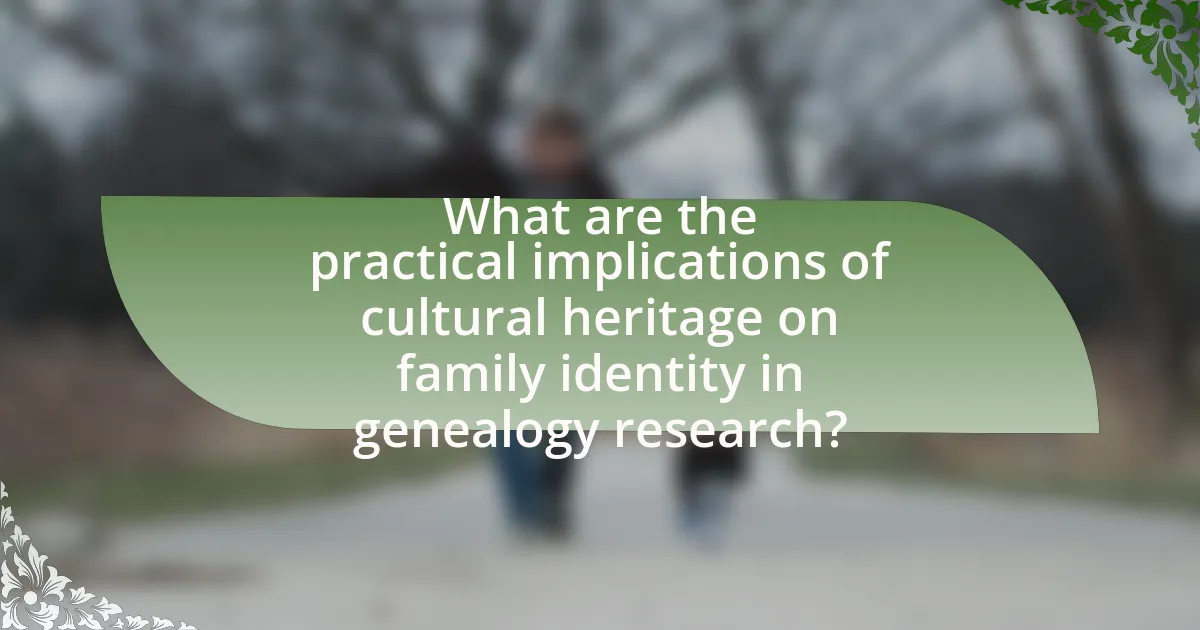
Cultural heritage significantly influences family identity in genealogy research by providing a framework for understanding familial connections and historical narratives. This influence manifests in the way individuals perceive their ancestry, often leading to a deeper appreciation of cultural traditions, values, and practices that shape family dynamics. For instance, research indicates that individuals who engage with their cultural heritage through genealogy often report a stronger sense of belonging and identity, as they uncover stories and legacies that resonate with their personal experiences. This connection to heritage can also guide family members in preserving cultural practices and fostering intergenerational relationships, thereby reinforcing family identity across generations.
How can understanding cultural heritage improve family connections?
Understanding cultural heritage can significantly improve family connections by fostering a sense of belonging and shared identity among family members. When individuals engage with their cultural heritage, they uncover traditions, values, and histories that bind them together, enhancing familial bonds. Research indicates that families who actively participate in cultural practices report stronger emotional ties and a greater sense of unity. For instance, a study published in the Journal of Family Psychology found that shared cultural experiences, such as celebrating traditional holidays or storytelling, lead to increased family cohesion and communication. This connection to cultural heritage not only strengthens relationships but also provides a framework for understanding family roles and responsibilities across generations.
What strategies can families use to celebrate their cultural heritage through genealogy?
Families can celebrate their cultural heritage through genealogy by actively researching their ancestry and documenting family histories. This involves creating family trees that trace lineage, which can reveal cultural traditions and historical contexts tied to specific ethnic backgrounds. Engaging in oral history projects allows families to gather stories from older generations, preserving unique cultural narratives and practices. Additionally, participating in cultural events or festivals related to their heritage fosters a sense of community and belonging, reinforcing family identity. Utilizing online genealogy platforms and DNA testing services can also provide insights into ethnic backgrounds, further enriching the family’s understanding of their cultural roots.
How can cultural heritage foster a sense of belonging within families?
Cultural heritage fosters a sense of belonging within families by providing shared traditions, values, and narratives that connect family members across generations. These elements create a common identity, reinforcing familial bonds and enhancing emotional ties. For instance, families that celebrate cultural rituals or maintain traditional practices often report stronger connections and a greater sense of unity. Research indicates that engaging in cultural heritage activities, such as storytelling or participating in festivals, can significantly improve family cohesion and identity, as these practices serve as a reminder of shared history and collective experiences.
What best practices should genealogists follow when considering cultural heritage?
Genealogists should prioritize cultural sensitivity and accuracy when considering cultural heritage. This involves thorough research into the cultural backgrounds of ancestors, understanding the historical context of their lives, and recognizing the significance of cultural practices and traditions. For instance, genealogists should utilize primary sources such as immigration records, census data, and oral histories to gain insights into the cultural identities of their ancestors. Additionally, engaging with cultural organizations and communities can provide valuable perspectives and resources that enhance the understanding of heritage. By adhering to these practices, genealogists can ensure that their research is respectful and reflective of the diverse cultural identities that shape family histories.
How can genealogists ensure respectful representation of cultural heritage?
Genealogists can ensure respectful representation of cultural heritage by actively engaging with and incorporating the perspectives of the communities they study. This involves conducting thorough research that respects cultural practices, traditions, and values, as well as collaborating with cultural representatives to validate findings. For instance, genealogists should utilize primary sources, such as oral histories and community records, to accurately reflect the lived experiences of individuals within those cultures. Additionally, they should be mindful of the language used in their narratives, avoiding stereotypes and generalizations that could misrepresent the cultural heritage. By adhering to these practices, genealogists can foster a more accurate and respectful understanding of family identities shaped by cultural heritage.
What tips can help genealogists navigate cultural complexities in their research?
Genealogists can navigate cultural complexities in their research by actively engaging with diverse cultural contexts and utilizing specialized resources. Understanding the historical and social backgrounds of different cultures enhances the accuracy of genealogical findings. For instance, genealogists should familiarize themselves with cultural naming conventions, which can vary significantly across cultures, affecting how names are recorded in historical documents. Additionally, utilizing resources such as local historical societies, cultural organizations, and community archives can provide valuable insights and context. Engaging with community members and experts can also facilitate a deeper understanding of cultural practices and traditions that may influence family histories.
What are common pitfalls to avoid in genealogy research related to cultural heritage?
Common pitfalls to avoid in genealogy research related to cultural heritage include relying on inaccurate or incomplete sources, overlooking cultural context, and failing to verify information. Inaccurate sources can lead to false conclusions about family history, as many online databases may contain errors. Overlooking cultural context is critical because understanding the traditions, naming conventions, and migration patterns of specific ethnic groups can provide essential insights into family connections. Additionally, failing to verify information through multiple sources can result in the acceptance of unsubstantiated claims, which is particularly problematic in cultural heritage research where oral histories may conflict with documented evidence.
How can biases affect the interpretation of cultural heritage in genealogy?
Biases can significantly distort the interpretation of cultural heritage in genealogy by influencing which historical narratives are emphasized or overlooked. For instance, researchers may prioritize certain ethnic or cultural backgrounds over others, leading to an incomplete or skewed understanding of a family’s history. This can manifest in the selective use of sources, where documents that align with the researcher’s biases are favored, while those that contradict their views are disregarded. Studies have shown that such biases can result in the perpetuation of stereotypes and misrepresentations of cultural identities, ultimately affecting how individuals perceive their own heritage and family identity.
What mistakes should genealogists be aware of when documenting cultural heritage?
Genealogists should be aware of the mistake of relying solely on oral histories without corroborating them with documented evidence. Oral histories can be influenced by memory biases and cultural narratives that may not accurately reflect historical facts. For instance, a study by the National Archives emphasizes the importance of cross-referencing oral accounts with official records, such as birth certificates, marriage licenses, and census data, to ensure accuracy in documenting cultural heritage. Additionally, genealogists often overlook the significance of understanding the cultural context of the records they are examining, which can lead to misinterpretations of family identities and heritage.
